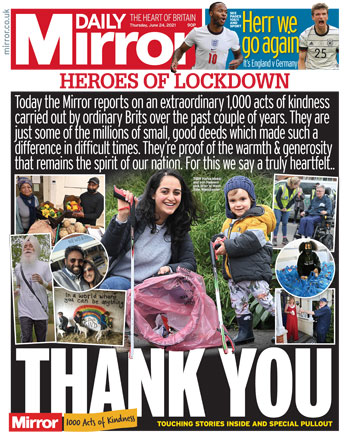
Alison Phillips is motivated by finding human touches in the bleakest of stories, providing a platform for simple acts of kindness and reflecting “the lived experience” of her readers that most people are decent and kind.
The Phillips approach was crystallised by the Mirror More Hopeful campaign and the idea that in the darkest situations, there is also hope.
“As journalists, we have a responsibility not just to tell the bleak but in the context that there is also hope, not only telling some of the story, all of it,” insists Phillips, the second woman to edit the Daily Mirror, founded in 1903 as a paper produced by women for women. The first editor, Mary Howarth, was told it should be “entertaining without being frivolous and serious without being dull”.
The Mirror More Hopeful campaign was launched with 1,000 acts of kindness, an idea of Jason Beattie, head of campaigns and politics.

The Hopeful manifesto noted “that while it’s our job to keep you informed and hold those in power to account, we are making a commitment to also report more hopeful news.”
The kind acts ranged from a stranger putting £100 through the letterbox of a single mother to Alison Hammond joining celebs backing Macmillan after the charity suffered a £20million drop in income.
The acts of kindness appeared in the paper and online and were shared on social media with readers contributing their own examples.
“Sometimes, the public want to be reminded that they are doing a great job. They kept going. They got their neighbours’ shopping. Real people, not enormous things,” notes Phillips who says not all headlines should be devoted to “badness”.
Phillips is not talking about “happy clappy” stories but that amongst really difficult and painful stories, you can also find “warm overtones”.
She cites inspiring pictures of Afghan refugees in Britain taking on a local cricket team.
The Mirror More Hopeful campaign appears to fit well with the paper’s traditional values and is part of a deliberate attempt to reach out to more idealistic young people.
According to Phillips, the Daily Mirror’s print sales were not as badly hit during the Covid lockdown as its rivals.
She believes this was partly because “our relationship with our readers has been as good as it has been for a very, very long time” but also because many of the paper’s readers couldn’t work from home and went out to work every day and were able to pick up a paper.
Our relationship with our readers has been as good as it has been for a very, very long time.
The online challenge
The main challenge she faces is to try to engender the sense of loyalty shown by remaining print readers to the increasing number of online readers.
“My big mission over the last year has been to try and ensure that all the brand values and all the things the Mirror believes in are visible to people who come to our website or come across from Facebook or Instagram,” explains Phillips who nonetheless believes the print version has “many years to go”.
She believes, overall, the Mirror is in “a really fortunate place” for attracting the young because they show a real passion for issues that the paper has traditionally campaigned on – anti-racism, fighting for justice, equality and fairness.
“They resonate with that audience. We have a way of making ourselves much more relevant to them than a lot of our competitors do. If you are an 18 or 19 year old, I can’t believe you want to read the Daily Telegraph,” says Phillips.
The Mirror editor however accepts that such people are never going to buy the Daily Mirror.
“Fair enough. I get that. We just have to ensure they find the Mirror digitally and I’ll think they’ll like it,” says Phillips who adds that in the Covid crisis, the paper has concentrated on explaining not just telling the news and being a trusted, rational brand in the midst of social media misinformation.
“One of the things the Mirror has always been good at is humanising the news. We try not to tell any story unless we have a real person telling the story. It’s a more empathetic experience. Being human is a very Mirror value,” says Phillips who came through the ranks of local journalism on the Harlow Star in Essex where she was brought up, before editing the student newspaper at Leeds University.
Online readers can also sign up for newsletters where they can specify the areas of news and topics they are most interested in.
Absolute Mirror numbers are difficult to come by at the moment because the paper is no longer using Comscore and has moved to Ipsos Iris which is still bedding in, but the overall approach seems to be working.
In May, according to Comscore, mirror.co.uk had overtaken the Sun and become the leader for both multi-platform and mobile unique visitors with the paper reaching 32 million adults across all platforms in April.
Phillips is still editing the paper from her spare room in East London with an occasional trip to the kitchen for variety. She is looking forward to getting back to the newsroom because “journalism is a very social business and the creativity and the buzz. Trainees don’t learn in their spare rooms.”
Phillips insists there will still be a Mirror newsroom in central London. Mirror HQ will “just be shrunken slightly” although there will be some reporters who don’t come in every day.
Rather like the split in the Labour party, the Daily Mirror has had to be sensitive to the beliefs of many thousands of readers.
Reporting Covid & Brexit
Despite the challenges of working from home, on one of the biggest stories of the times, Covid, the Daily Mirror was able to stand out unambiguously against the anti-vaxxers.
On another, Brexit, the paper has faced greater difficulties and its coverage has had to be nuanced.
Mirror readers showed a small majority in favour of Leave and although the paper supported Remain, rather like the split in the Labour party, the Daily Mirror has had to be sensitive to the beliefs of many thousands of readers.
During the referendum campaign, the paper tried to tell it straight and explain what it thought the real consequences of Brexit would be.
“Post Brexit, there was a vote. It happened and it’s done and we have to try to move forward in the most constructive way we can. Sometimes it is easier to be angrier, hysterical and ranty ravey than it is to be rational and reasoned which is where we want to be,” says Phillips.
She believes as Prime Minister Boris Johnston promised to get Brexit done, he must now take responsibility for its failings rather than the people who voted for Brexit in good faith.
“Even the readers who voted for Leave aren’t happy with the way it has been carried out. They feel let down by how it has played out. It wasn’t what they were told was going to happen,” Phillips explains.
The Daily Mirror has carried detailed articles on the effects of Brexit – everything from supermarket shortages to the re-appearance of telephone roaming charges and plummeting of UK trade with the European Union since January.
On climate change, the Daily Mirror has been able to take a more full-throated approach with an entire edition devoted to the issue in November 2019 with reports from all around the world.
A second special edition is already being planned, focused mainly on the UK and rather than a “we are all doomed message”, instead provide a guide to how individuals can respond.
Phillips believes it would be wrong to offer only stories that are so negative that they just turn off people entirely and although tackling climate change is a governmental challenge, it is the engagement of the public that makes governments act.
“You can bang on endlessly about all sorts of stuff day in day out but if the readers aren’t going to read it, we are not doing our jobs properly. It’s got to be compelling tabloid reading,” Phillips believes.
It doesn’t all have to be big picture stuff about melting icebergs, it can also be about everyday life such as daffodils flowering two weeks early, she explains.
We are in a good place at the moment in terms of editors but is there a pipeline of women coming through?
Diversity & inclusion
As the second female editor of the Daily Mirror, even after a gap of 118 years, is Phillips’ appointment three years ago evidence that the journalism gender wars have finally been won?
As well as the Daily Mirror, women are also editing nationals such as the Sunday Times, the Financial Times, the Guardian and The Sun.
Up to a point, replies Phillips who chairs the Women in Journalism organisation and who previously edited The New Day, the short-lived, politically neutral newspaper aimed mainly at women.
“We are in a good place at the moment in terms of editors but is there a pipeline of women coming through?” asks Phillips who says she does not want another hundred years to pass before another woman is appointed editor of the Daily Mirror after her.

On diversity, she believes progress has been made but more needs to be done to ensure that papers’ staff reflects the population they are trying to reach.
Her favourite scoop was exposing former Johnson adviser Dominic Cummings’s controversial journey to the north of England, a collaboration with The Guardian. Each paper had a single different source and putting the two together got the story past the lawyers in the face of Downing Street denials.
The scoop she was most jealous of – The Sun’s Matt Hancock relationship pictures
“Amazing story. Next time,” the Mirror editor jokes.
Is she hopeful about the future of the Daily Mirror?
“Goodness yes. Without a doubt. Absolutely,” replies Phillips. She adds: “I feel very confident that we are only going to go from strength to strength and reach out to a new younger audience that will give us a really strong, sustainable future with all our heritage and values transferred to a new, younger more modern audience.”
It will come complete with a dash of hope, optimism and kindness amid the gloom.
This article was first published in InPublishing magazine. If you would like to be added to the free mailing list, please register here.












